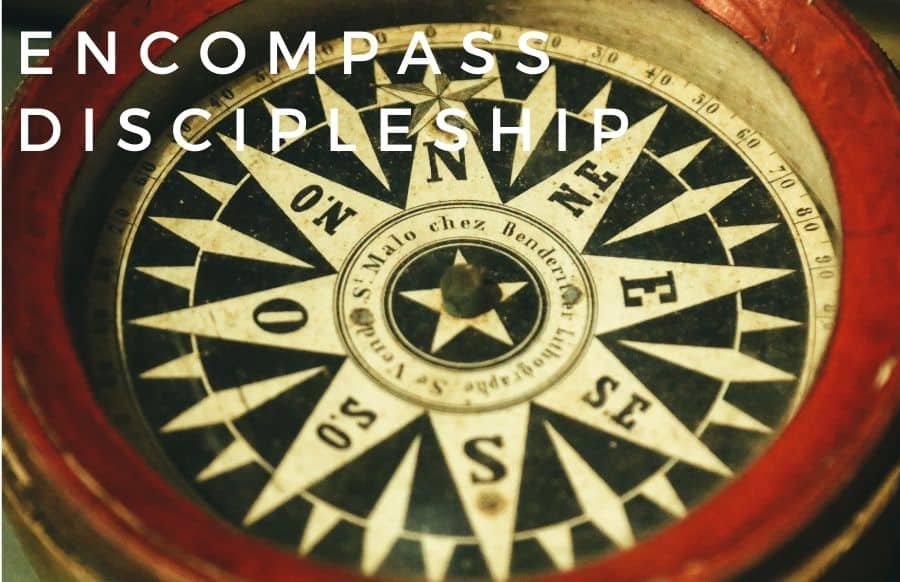A Biblical Model for Discipleship
 The work we’re doing with curriculum is really about discipleship. It’s about a long-term strategy for building people who are committed to following Jesus and living as His disciples. So, we have to think bigger than just what happens in the classroom on Sunday morning (or any other day).
The work we’re doing with curriculum is really about discipleship. It’s about a long-term strategy for building people who are committed to following Jesus and living as His disciples. So, we have to think bigger than just what happens in the classroom on Sunday morning (or any other day).
I want to suggest there are four elements in a biblical discipleship strategy. These four things should impact how we think about what takes place in a church, home, or classroom. In turn, they should impact and shape the resources we create to support those activities.
The four elements of a biblical discipleship strategy are Community, Calendar, Calling, and Content. I have written about these things (Community, Calendar, and Content) in an article you can find here. In this article, I want to build on what I had to say in that article and articulate my thinking about how this is relevant to teaching/discipling preschoolers. At this point I’m talking about all preschoolers, not just babies.
My initial efforts were aimed at identifying elements of a discipleship strategy that could be found in the Old Testament. So, this model is driven first by my perception and understanding of what the Old Testament has to say about raising people committed to serving, worshiping, and obeying Yahweh in the context of the Israelite people in the Old Testament. But, I also believe God’s ways always reflect reality. That is, God does things a certain way for a reason. He prescribes that teaching be done a certain way because it aligns with the way people actually are. His methods find rationale in the way He created people to be. This means that biblical strategies for teaching and discipleship will be consistent with the best thinking about how people learn and grow.
If I’m right about that, then I want to suggest that the Community, Calendar, Calling and Content model fits well with a developmental strategy for preschoolers and other age groups. Here’s my thinking…
Community – Forming Identity
Babies are soaking up all kinds of information through their senses from the very beginning. This information is constantly being processed, sorted, and organized in ways that impact the child’s brain. This is genuine learning. The process may be slow in comparison to adult models of learning, but it is real learning, nonetheless. Everything the child is experiencing is impacting its understanding of self. The baby’s identity is forming.
The child’s early development of its identity is, therefore, shaped by its immediate environment, including the people in that environment. In fact, it’s the people in the life of the child that determine and define its environment. It’s not a stretch to say that the people in the life of an infant are the primary factors shaping its identity. From the earliest moments, a baby’s identity is being defined by the people around it. This is community, even if it’s only one person. A newborn will not long survive without someone caring for it.
We should not be surprised then, that God would note soon after the creation of the first person that “it is not good for the man to be alone.” The entire biblical record underscores that being in relationship with Yahweh means being in relationship with His people. Community shapes and defines identity. From a developmental perspective, identity grows from community. From a theological perspective, biblical identity grows from biblical community.
Calendar – Forming A Story
As a child matures, it will begin to understand that it is a person (it has an identity) living in the context of time. This, too, is a slow process that occurs as the child becomes aware of the rhythms and cycles of life. The baby’s physical needs occur in cycles. Days and nights come and go with enormous regularity and predictability. Family routines underscore for the young child that certain things happen, then happen again. The baby is learning that time is moving.
The child’s awareness that it is moving through time is essential to its developing identity. Without it, the child will be “stuck” in the moment. It will never develop a memory of the past or the anticipation of a future. It will forever be a baby living only in the moment. However, the recognition that it is passing through time will create a memory of the past, the anticipation of a future, and a deeper awareness of the present. In short, the child will begin to understand that it has a story and this story further defines who it is.
The rhythms of life are important to God as well. It was God who created day and night. It was God who declared the seventh day of each week (the Sabbath) to be holy and set apart. It was God who created the seasons. And, it was God who prescribed festivals and events to serve as reminders that He has acted in history to accomplish His purposes. God, it seems, is interested in helping His people live with a distinct memory of His work in the past as well as the expectation that He will continue to work to accomplish His purposes in the future. The biblical calendar is part of God’s plan to help God’s people understand Who He is, who they are, and how they are to live. The calendar reveals, teaches, and underscores God’s story and the story of God’s people, including the children He calls us to teach.
In short, the calendar connects God’s unfolding story with the child’s developing story, enhancing and shaping its identity as an individual with a unique story, but a story within God’s story.
Calling – Forming Purpose
Sooner or later, most people begin to wonder why they exist. They want to know if there is purpose to their lives. Even those who have a strong biblical identity and see their story as part of God’s story will begin to question how they fit in to God’s plans for humankind and the future.
This search for purpose is built into each person by God Himself. Just as people were created by God to be in relationship with other people (Community) and to be part of an ongoing story (Calendar), so God designed that people would live with purpose. This purpose is evident in Scripture as early as Genesis 2:15. God’s calling of Abraham in Genesis 12:1-3 reiterates the outward orientation of this purpose and Exodus 19:6 underscores the transfer of purpose to the people of Israel as a whole. God’s calling on Israel is called “election” in theological terms and is inescapable in the biblical text.
Israel’s election to purpose is an inseparable part of their story. It isn’t something tacked on to the story at some later point. As noted above, God’s call to “Father Abraham” in Genesis 12:1-3 is just that; a call. From the very beginning of the Abrahamic narrative, it is clear that God intended to use Abraham and his descendants to bless “all the nations of the earth.” To understand the biblical story is to understand that God chose a special people and called them to a specific purpose.
When we teach the biblical story to any age group, it is inevitable that the learners (children, youth, or adults) will be confronted with the calling of God’s people and its implications for His people today. The point here is that no special effort has to be given to teaching the calling of God as long as we’re teaching the story of God.
Community, Calendar, and Calling are three essential components of a biblical model of discipleship. And, they each address a critical developmental need within children and learners of all ages; Identity, Story, and Purpose. But, there is a fourth component that is equality essential to developing biblical disciples; Content.
Content- Grounded In Truth
At the end of the day, it is content that grounds a biblical model of discipleship in the truth. Lots of communities can provide a child with identity, story, and purpose. But without biblical content, the child will not become a mature follower of Jesus.
We live in a world that often denies the existence of absolute truth. In a postmodern culture, truth is in the eye of the beholder. Others may agree that truth exists, but define it very differently than Christianity. The Bible, however, insists that truth is real AND that it must be defined within fixed parameters. A Christian believes that truth is grounded in reality and that reality can be truly understood only in the context of the biblical record. A biblical model of discipleship, therefore, must contain biblical content.
Historic Christianity provides us with centuries of precedent and careful scholarship that help establish the boundaries of orthodox Christianity. That’s not to suggest that everything that can be said about the Bible has been said. Certainly not. It does mean, however, that we are not starting from scratch when it comes to articulating biblical content. Those who wish to facilitate biblical discipleship should do so with an awareness of our history, a confidence in the leading of the Holy Spirit in what we discern from Scripture today, and with humility, recognizing that future generations will have more to say as well.
Most of those with responsibility for discipleship within the contemporary church will acknowledge the need for biblical content. Our point here is simply that content can’t be taken for granted. Content for any given age group must be considered thoughtfully and intentionally. Content is an essential component of an overall strategy for biblical discipleship along with Community, Calendar, and Calling.
The bottom line in all of this is that a biblical model of discipleship also coincides with the developmental needs of learners, especially preschoolers and children. Biblical community shapes biblical identity. A biblical calendar will link the individual’s story to the biblical story. A sense of biblical calling will provide the learner with biblical purpose and direction. And, biblical content will ground all of it in reality and truth.



